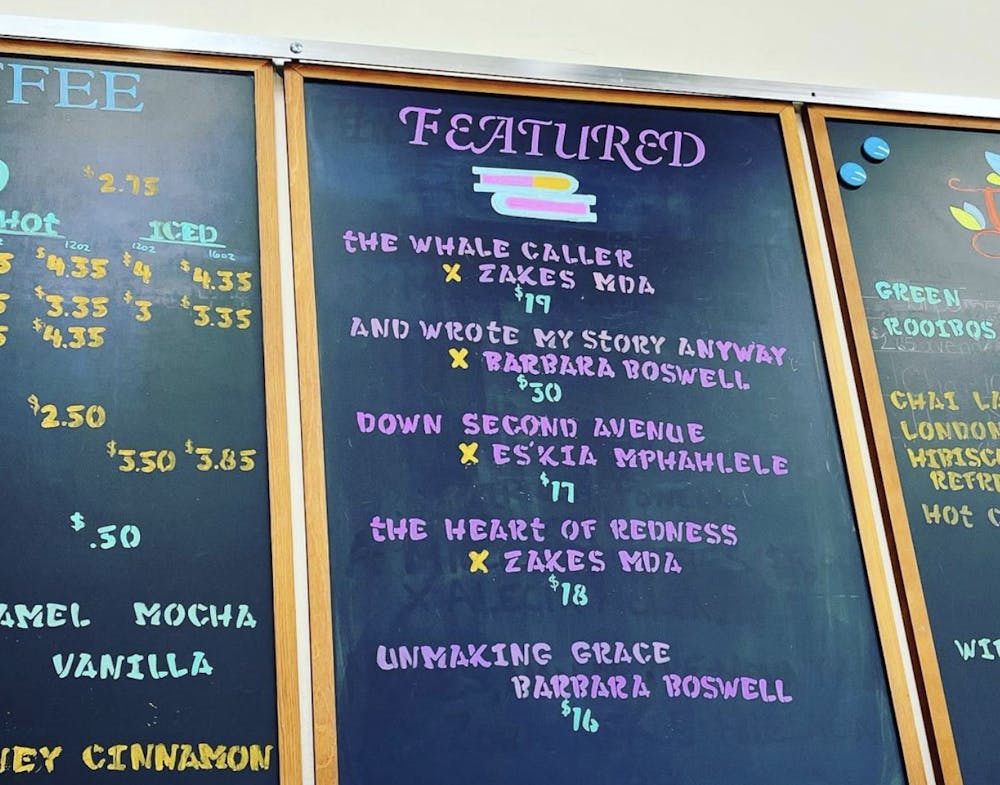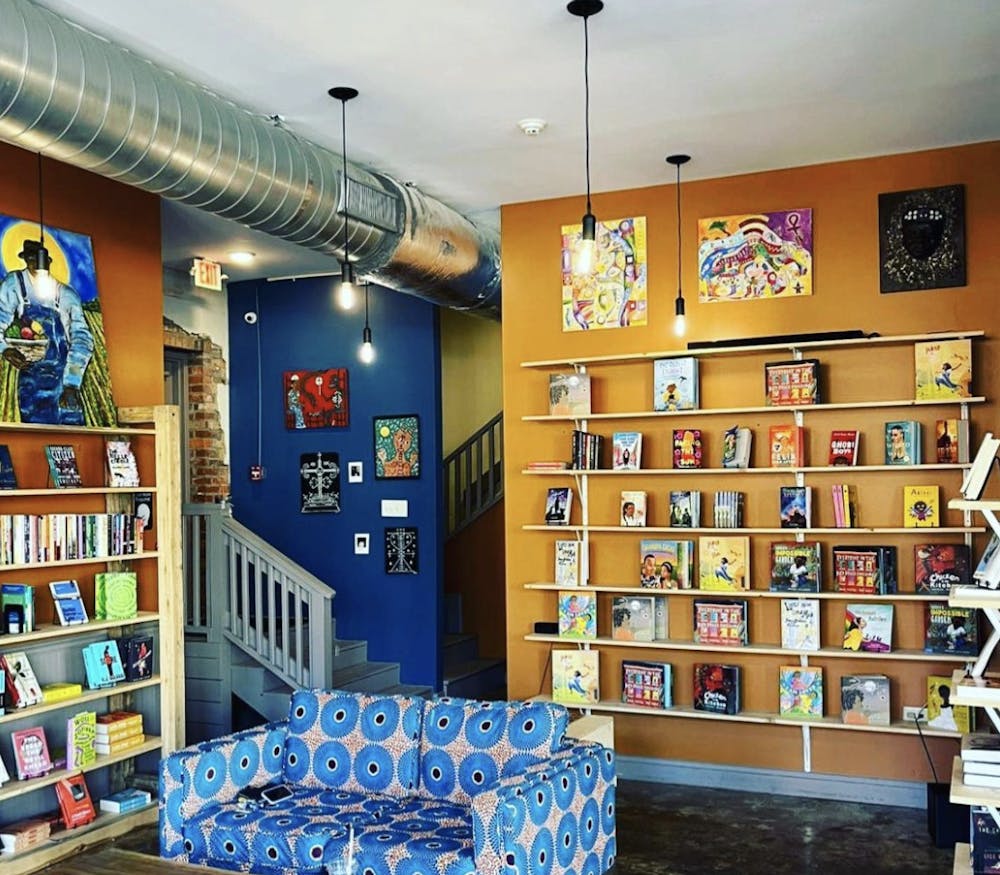Situated at the corner of Angier and South Driver Street in East Durham, customers at the Rofhiwa Book Café have a view of passersby from all four directions, though most seem too engrossed in their books to notice. Plants sit near the café’s sun-drenched windows, and the artwork on the walls complements the bookshelves lined with literature by Black authors.
The Rofhiwa Book Café first opened in February 2021 as an online book retailer, then later in May as a physical storefront. Owner Beverley Boitumelo Makhubele and curator Naledi Yaziyo dreamed of creating a space for the Durham community to experience Black literature. The shop sells books by Black authors from all over the world, including rare, out-of-print books and literature that is hard to find in big-box stores.
Makhubele never enjoyed the feeling of just walking into a bookstore and walking out with a book or sitting in coffee shops without interacting with others, so they created a space that combines both atmospheres of a bookshop and of a coffee shop with coffee from Black roasters.
“It felt important to have a bookstore that people were incentivized to hang out in, and a coffee shop that people were incentivized to hang out in,” Makhubele said.
Makhubele is from Johannesburg, South Africa, and they moved to the United States in their teens. On their trips back home to South Africa, Makhubele had begun collecting Black, African, rare and out-of-print books. As their collection grew, they began to develop the idea of sharing their collection as an institute or library in later years.
But in 2017, Makhubele started thinking about how they could share their collection sooner and what an iteration of their collecting practice would look like in a store.
Makhubele moved to East Durham in 2019 and was already searching for a storefront space when they met Yaziyo, a current fourth-year Duke graduate student in cultural anthropology from Cape Town, South Africa. Makhubele invited Yaziyo to curate the selection for their shop.
“She has the depth as a wide-reading person, so I think she has been able to pull together selections that really matched the feeling that I had, but also exceeded it,” Makhubele said. “The selection has taken on a life that I couldn’t have imagined.”
Since Rofhiwa is a Black-focused bookstore, Makhubele wanted the shop to be in East Durham, a neighborhood where the literature reflects the people living around it. A location on South Driver Street became available soon after Makhubele and Yaziyo formed their partnership, and the two jumped on the deal.
As the curator and reviewer for Rofhiwa, Yaziyo forms relationships with writers, artists, members of the publishing industry and community partners. She works on the book selection and display, thinking about how to best organize and present the books.
Typical bookstores and libraries sort books by genre. Non-fiction and fiction are separate, and subcategories divide the books into fantasy, memoir, science fiction and other categories. However, the books in Rofhiwa don’t follow these categories as strictly; the shelves are instead organized by categories Yaziyo establishes based on the current themes of Black literature. In this way, the book selection at Rofhiwa is a living collection responding to the movements and ideas of the present with both classic and contemporary books by Black authors.
“We are always trying to figure out where to put ourselves in relation to how Black literature is moving and emerging in the conversations that are happening around us. And so, you will see that reflected, for instance, in our book selection,” Yaziyo said.

She described how she created a decolonial shelf in response to conversations about what decolonization looks like in different parts of the world where Black people are organizing for freedom. As these conversations and relationships evolve, Yaziyo works to ensure that the books on the Rofhiwa shelves evolve with them.
Yaziyo said the children’s section is a part of the café that has surprised her, since the store did not originally have a large children’s selection when it opened. Makhubele and Yaziyo noticed that families who visited the store loved the children’s section. They enjoyed finding a collection of Black children’s books they couldn’t find in larger book stores.
Two first-time customers at Rofhiwa, Kerry and Dañela, expressed frustration with trying to find Black books in larger stores. Kerry is a teacher and often has to special-order books she wants from stores like Barnes & Noble if she can even get them at all.
Kerry buys books at Rofhiwa because she knows she is represented there, and she brought Dañela to the store as a surprise. They both appreciated seeing books by authors from outside the U.S.
“I love the book business, but also I like to see representation of the African diaspora. We’re both from the Caribbean, so I love that you can have folks that represent the American culture, but also the diaspora around the world,” Dañela said.
Access to literature has been one of Rofhiwa’s greatest difficulties. The publishing industry is structured to only enable access to certain kinds of literature, and there isn’t good infrastructure for moving books Yaziyo and Makhubele want from various parts of the world, especially for books printed in developing countries. Yaziyo had to rework the book selection for Rofhiwa’s opening weekend because many of the original titles were inaccessible when it came time to order the books.
Yet the selection of books Rofhiwa offered for their opening weekend was still successful. Rofhiwa completely ran out of books. A new shipment wouldn’t come in time, so Makhubele hopped in a car with a friend and drove to Philadelphia and back to bring more books to sell.
These challenges have come with unexpected rewards. Originally imagined as a space for books and coffee, Rofhiwa also serves as a gallery to showcase the work of Black artists. The idea came from a Durham native who walked into the store and suggested they show his son Shambo Medina’s artwork. When Makhubele and Yaziyo went to meet Medina and view his art, they said it felt like meeting a brother.
“We were all just so in tune and kind of felt very similarly about the kind of space we would like to make,” Yaziyo said.
They held an opening initial exhibit for Medina’s work, where Yaziyo curated books to Medina’s art and he chose pieces that worked in conversation with the book selection.
Their art display has grown to include works from Lesly Pierre Paul, an artist from Haiti who runs New Vision Art School on very little funding for students from about three to 20 years old. When people come into Rofhiwa and decide to buy Paul’s artwork, the funds help his school in Haiti.
The organic relationships that have come out of opening Rofhiwa have been a wonderful surprise to Makhubele and Yaziyo. Medina is now in contact with and working with Paul in Haiti. They’ve also had numerous calls from elders in the community wanting to donate their own book collections or requests for Makhubele and Yaziyo to help them sift through their shelves.
“It’s opened up a whole other world of book collecting and of preservation of legacy work,” Makhubele said.
Get The Chronicle straight to your inbox
Signup for our weekly newsletter. Cancel at any time.

